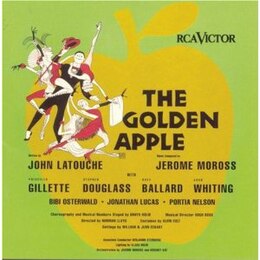Productions
The Golden Apple was one of the first musicals produced Off-Broadway at the Phoenix Theatre, where it opened on March 11, 1954. [2] The musical transferred to Broadway on April 20, 1954, to the Alvin Theater where it played for only 125 performances despite rave reviews. The original production starred Kaye Ballard as Helen and Stephen Douglass as Ulysses. [3] It was the first Off-Broadway show to win the Best Musical award from the New York Drama Critics' Circle. [4] While Latouche's lyrics are much praised, Steven Suskin wrote: "The Golden Apple benefits from imaginative theatricality in all departments but it was the more-than-glorious score that carried this brilliant musical theatre experiment from Off Broadway to the Alvin", a Broadway theater. [5]
The musical is through-composed and exhibits features similar to more operatic musicals like Porgy and Bess , The Mother of Us All , Candide , and The Most Happy Fella . [6] Jerome Moross was a classical composer of concert music and ballets, as well as a highly appreciated film score. Though the show is held in high esteem by devotees of musical theater, the full score was not commercially recorded until 2015 and the show has never been revived on Broadway. The musical is remembered in part for introducing the standard "Lazy Afternoon," sung by Ballard, and its fantastical, suggestive settings by William and Jean Eckart. [7]
The musical was presented Off-Broadway in 1961 at the Equity Library Theatre, and in 1962 it was produced at the York Playhouse. Both productions were directed by Robert Ennis Turoff and starred Roberta MacDonald as Helen and Stan Page as Ulysses. [8]
The musical continues to receive occasional productions. For example, a 1990 production by the York Theater Company in New York featured Muriel Costa-Greenspon. [9] The work was produced in 1995 by Light Opera Works in Chicago, Illinois [10] and in 2006 by the 42nd Street Moon Company in San Francisco, California. [11] The Shaw Festival, Niagara-on-the-Lake, Ontario, Canada, presented a staged concert in October 2006. [12]
The complete piano-vocal score was published for the first time in 2009 by Alfred Music Publishing. In October 2014 the Lyric Stage in Dallas, Texas, presented the first performances with full orchestra since the show's Broadway run. [13] On February 8, 2015, Los Angeles' Musical Theatre Guild performed a one-night engagement of The Golden Apple with full orchestra at the Moss Theatre in Santa Monica. [14]
It was presented as part of the New York City Center "Encores!" staged concert series from May 10–14, 2017. [15] [16]
Recordings
The Original Broadway Cast Recording, released by RCA Victor in 1954, had to cut a great deal of the lengthy sung-through score in order to fit on a single Long Playing disc. The conductor was Benjamin Steinberg. (Extended cast albums were unheard of at that time, with the precedent being set two years later with a triple LP album of Frank Loesser's The Most Happy Fella .) This fifty-minute version of the score was the only one available for six decades.
The record label PS Classics recorded performances of the Lyric Stage production and released the first full-length recording of the score on May 19, 2015. [17]
This page is based on this
Wikipedia article Text is available under the
CC BY-SA 4.0 license; additional terms may apply.
Images, videos and audio are available under their respective licenses.
